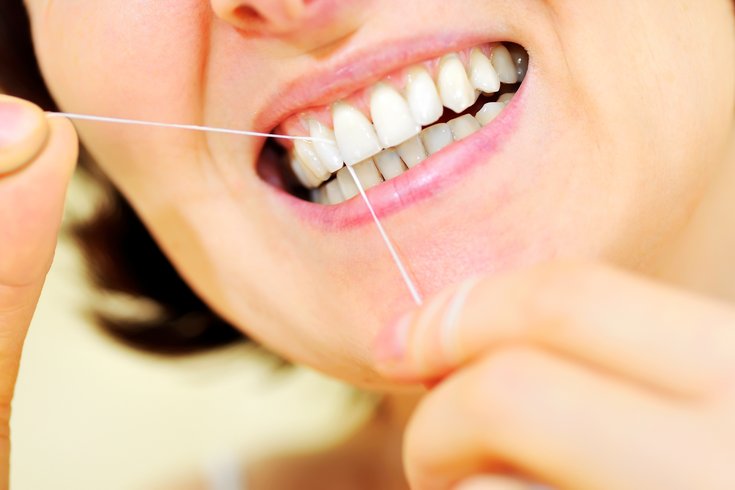
March 14, 2024
 Source/Image licensed from Ingram Image
Source/Image licensed from Ingram Image
Flossing helps protects against gum disease, which has been linked to an increased likelihood of heart attacks, stroke, rheumatoid arthritis and diabetes.
For many people, flossing their teeth is a hated task – right up there with taking out the garbage and cleaning the bathroom. It tends to be one of those daily chores that people neglect and then feel guilty about, spawning an endless cycle of shame, loathing – and plaque.
Plaque is that sticky film containing bacteria that resides in between the teeth, unless it is brushed and flossed out. Clearly, we are falling down on the job.
The U.S. Centers for Disease Control and Prevention reports that 47.2% of Americans 30 and older have some form of gum disease, which flossing can help prevent. A 2018 study found that only 32% of people 30 and older said they flossed once a day, while 68% said they flossed once a week.
Anti-flossers had their moment in 2016, when the Associated Press published a story saying that when the "... federal government issued its latest dietary guidelines this year, the flossing recommendation had been removed, without notice. In a letter to the AP, the government acknowledged the effectiveness of flossing had never been researched, as required."
Not surprisingly, the American public celebrated, while dental health professionals protested.
"The fact that there hasn't been a long-term, huge population-based study of flossing doesn't mean that flossing is not effective," Dr. Timothy J. Iafolla said in an "Ask the Expert" post by the National Institute of Dental and Craniofacial Research. "It simply suggests that large, multi-year studies of individual health behaviors (of any kind, flossing included) are difficult and expensive to conduct."
Ultimately, flossing once a day is a must, dental health experts say. Not doing so increases the chances of developing tooth decay, cavities, gum issues and other diseases.
"While the research on (the connection between) flossing and cavities is hazy, the research on flossing's role in preventing gum disease is much clearer," Leena Palomo, professor and chair of the Ashman Department of Periodontology & Implant Dentistry at New York University's College of Dentistry, told WebMD in 2016. "That's why dentists, hygienists and periodontists continue to recommend flossing."
Gum disease, also known as periodontitis, is an infection that damages the soft tissue around the teeth, characterized by puffy, red gums that bleed easily. Other symptoms of periodontitis include tender gums, bad breath that won't go away, and pus between the teeth and gums.
"In my practice, it's clear that people who floss daily have healthier gums and keep their teeth longer," Sivan Finkel, a professor at New York University College of Dentistry, told WebMD. "In fact, patients who have early-stage cavities often reverse that decay by flossing daily as well as brushing and maintaining good oral hygiene."
Gum disease can lead to a receding gum line, destruction of the bone that supports the teeth and tooth loss. Gingivitis is a common, early form of gum disease.
People with gum disease have a two-to-three times higher risk of heart attack, stroke or other cardiovascular events, according to research. Gum disease is also linked to rheumatoid arthritis and diabetes.
A 2023 study even found that people with gum disease or tooth loss have evidence of an increase in the rate of shrinkage within the hippocampus, a part of the brain that plays a major role in learning and memory.
If none of these findings convince you that you need to floss, perhaps the fact that it helps control bad breath may. Just sniff a string of floss after you remove it from between your teeth, and perhaps you will be swayed.
To make the task easier, it doesn't matter when you floss – before or after brushing your teeth – as long as you do it once a day, according to the American Dental Association. Pick a time that's best for you. For instance, if you tend to be too tired before bed, floss your teeth in the morning.
Start slowly, New York City-based board-certified cosmetic dentist Greg Gelfand told allure earlier this year.
"The truth is that most people don't floss and may be ashamed of their less-than-ideal oral-care routine," he said. "It can be tough for some to go from not using floss to revamping their entire routine."
To jump-start, try flossing just your front teeth, adding in the back rows day-by-day.
"With this phase-in approach, you can go from not flossing at all to hopefully building a habit out of it," Gelfand said.
Choosing a floss you like may help. Allure highlighted nine popular flosses, with Cocofloss Delicious Mint Dental Floss coming in No. 1.
The American Dental Association gives these instruction for upping your flossing game:
• Break off about 18 inches of floss and wind most of it around one of your middle fingers. Wind the remaining floss around the same finger of the opposite hand.
• Hold the floss tightly between your thumbs and forefingers.
• Guide the floss between your teeth using a gentle rubbing motion.
• When the floss reaches the gum line, curve it into a "C" shape against one tooth and gently slide it into the space between the gum and the tooth.
• Repeat this procedure for each tooth using a fresh part of the floss, and don’t forget to floss behind your last tooth.
If you don't like classic string floss, use pre-threaded flossers that come fitted with picks or brushes at one end, or a water flosser, which uses a gentle stream of water to rinse away food and plaque, the ADA says.
Click here for ADA-seal-of-acceptance oral health products.